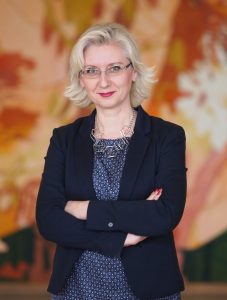The European Public Health Association (EUPHA) was founded in 1992. Since then, it has evolved into a well-established organisation that is represented in 47 countries of the WHO’s European Region.

“It is very impressive to see how EUPHA has developed since its earliest days. My aim is to build on this, to continue providing our members with the best possible support, and to further develop our organisation,” says Marieke Verschuuren, who has been Executive Director of EUPHA since July 2022. Prior to this, she was President of the Public Health Monitoring & Reporting section and Secretary of the EUPHA Executive Council, which is charged with managing the association. Her predecessor, Dineke Zeegers Paget (see also the Healthy Europe interview titled “Everyone has a right to health”), who held this position for 25 years, was instrumental in this development and will remain at EUPHA as strategic advisor.
The scientific association was set up in 1992 as an initiative by 15 public health associations and institutes from 12 countries in Europe. It currently has no fewer than 85 members from 47 countries in the WHO’s European Region, and brings together around 40,000 public health experts who are active in the fields of research, policy, practice and training/education. This is just one of many good reasons for celebrating the 30th anniversary of EUPHA at the 15th European Public Health Conference in Berlin.
The umbrella organisation for the area of public health was founded on the initiative of social medicine practitioner Louise Gunning-Schepers and Jouke van der Zee, who was Director of the Netherlands Institute for Health Services Research (NIVEL) until 2008. Louise Gunning-Schepers was also the first president and Jouke van der Zee the first secretary of the newly established organisation. EUPHA’s central office is based in NIVEL’s Utrecht headquarters, and the European association is financed by membership fees and the European Union Health Programme. EUPHA also has a satellite office in Brussels and a team of seven people who organise the association, some of whom mainly work on the European Public Health Conference.
From 200 to 2,000 participants
EUPHA has held annual scientific conferences every year since it was founded, the first one taking place in Paris in 1992. The number of participants has grown from around 200 to around 2,000. Since 2008, the conferences have been known as European Public Health (EPH) Conferences and they have been organised together with national public health associations and international partners. Every year, a different European city is selected as a venue – with the exception of the pandemic years 2020 and 2021, where events planned for Rome and Dublin respectively could only be held online. Accordingly, Europe’s public health experts are all the more delighted that it will be possible to come together in person again at this year’s EPH Conference in Berlin (see also the article “Sharing knowledge in the heart of Europe” about the 2022 EPH Conference).
EUPHA also publishes the multidisciplinary European Journal of Public Health. This includes contributions from social medicine, epidemiology, health services research, management, ethics and law, health economics, social sciences and environmental health, and in 2021 it had an impact factor of 4.424. The scientific journal is produced by the Oxford University Press on behalf of EUPHA and has been available free of charge for all readers as an open access journal since June 2021. Peter Allebeck, Professor of Social Medicine at the Karolinska Institutet and medical officer at the Center for Epidemiology and Community Medicine, Stockholm County Council, is the editor-in-chief of the European Journal of Public Health.
A vision for the next generation
EUPHA encourages the creation of operational sections for specific public health themes, which are international and open to all public health experts. The goal is to bring together researchers, policymakers, and practitioners working in the same field for knowledge sharing and capacity building. These themed networks are called EUPHA sections. Having begun with just a few, there are now 26 in total, from Child and Adolescent Public Health to Urban Public Health.
EUPHA is also recognising the importance of enabling the next generation to take a leading role in building a better future – greener, healthier and more inclusive. EUPHA has committed to investing in these young public health professionals through EUPHAnxt – a very active network for the coming generation, which currently lists around 3,800 public health students and young professionals. Set up in 2011, it has an abstract mentoring programme that allows its members to obtain feedback from experienced reviewers on abstracts that are submitted to the annual EPH Conference. During the conference, EUPHAnxt organises skill-building workshops specifically targeting young professionals and a “join the network” meeting is organised with a view to welcoming and recruiting new members.
A politically relevant subject

EUPHA defines public health as the science and art of preventing disease, prolonging life and promoting health and well-being through the organised efforts and informed choices of society, organisations, public and private, communities and individuals, and includes the broader area of public health, health services research, health service delivery and health systems design. “As a social and behavioural scientist, I was fascinated by the comprehensiveness of a broad definition of public health that EUPHA has promoted because it made perfect sense to me. Clearly, if we strive to improve people’s health, this cannot happen without a deep understanding and influencing the wider determinants of health – a diverse range of social, economic, and environmental factors,” explains Iveta Nagyova, EUPHA president and Head of Department of Social and Behavioural Medicine at Pavol Jozef Safarik University in Kosice, Slovakia. “Moreover, to address the ongoing and future public health challenges, national, regional and global policymakers need to continue to call for the whole of government and whole of society strategies. Public health is an ideal opportunity to enhance multisectoral and transdisciplinary collaboration,“ she continues.
“Influencing health policies at European, national and regional levels is not possible without a solid knowledge base and application of knowledge translation principles. It is essential that the analysis can be presented to policymakers and politicians in a timely and attractive manner. This is why we set up the EUPHA Rapid Response Team – a group of dedicated expert spokespersons, usually presidents or vice-presidents of EUPHA sections, who provide information in response to questions from the media or politicians on behalf of EUPHA in a very short timeframe, usually within 24 hours,” adds Iveta Nagyova. To conclude, over the period of the past 30 years, EUPHA has developed as a strong and influential player in the field of public health, working continuously on its vision of improved health and well-being and narrowing health inequalities for all Europeans.
